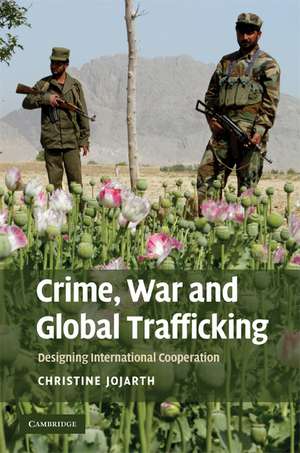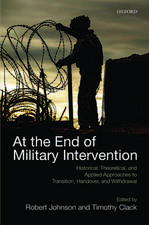Crime, War, and Global Trafficking: Designing International Cooperation
Autor Christine Jojarth PhDen Limba Engleză Hardback – 8 apr 2009
| Toate formatele și edițiile | Preț | Express |
|---|---|---|
| Paperback (1) | 291.69 lei 6-8 săpt. | |
| Cambridge University Press – 8 apr 2009 | 291.69 lei 6-8 săpt. | |
| Hardback (1) | 725.14 lei 6-8 săpt. | |
| Cambridge University Press – 8 apr 2009 | 725.14 lei 6-8 săpt. |
Preț: 725.14 lei
Preț vechi: 843.19 lei
-14% Nou
Puncte Express: 1088
Preț estimativ în valută:
138.77€ • 144.06$ • 115.71£
138.77€ • 144.06$ • 115.71£
Carte tipărită la comandă
Livrare economică 25 martie-08 aprilie
Preluare comenzi: 021 569.72.76
Specificații
ISBN-13: 9780521886116
ISBN-10: 0521886112
Pagini: 342
Ilustrații: 1 map 30 tables
Dimensiuni: 157 x 234 x 21 mm
Greutate: 0.68 kg
Editura: Cambridge University Press
Colecția Cambridge University Press
Locul publicării:Cambridge, United Kingdom
ISBN-10: 0521886112
Pagini: 342
Ilustrații: 1 map 30 tables
Dimensiuni: 157 x 234 x 21 mm
Greutate: 0.68 kg
Editura: Cambridge University Press
Colecția Cambridge University Press
Locul publicării:Cambridge, United Kingdom
Cuprins
1. Introduction; 2. The concept of legalization; 3. Problem constellation; 4. Narcotic drugs: UN Convention against Illicit Traffic in Narcotic Drugs and Psychotropic Substances; 5. Money laundering: the Financial Action Task Force and its Forty Recommendations; 6. Conflict diamonds: the Kimberley Process Certification Scheme; 7. Small arms and light weapons: the United Nations Program of Action; 8. Conclusion.
Recenzii
'What constellations of interest, risk and uncertainty are conducive to the creation of more or less legalized international institutions? In an attempt to shed light on this question, Christine Jojarth conducts an exploratory probe of four international institutions established to respond to criminal and warlike activities. Her results are illuminating about the strengths and weaknesses of functional and structural theories of international institutions.' Robert O. Keohane, Princeton University
'Too many books on global crime are just a collection of anecdotes and 'war stories' that contribute little to our thinking on what to do about this growing threat. In these pages, Christine Jojarth provides sound analytical foundations on which to base what is an indispensable policy debate. This is one of the most rigorous books on this subject.' Moisés Naím, author of Illicit: How Smugglers, Traffickers and Copycats are Hijacking the Global Economy
'In this compelling new book, Jojarth uses four case studies to examine the validity of the design of international institutions presented by functionalist theories. Using theoretical and empirical evidence in a stimulating and innovative way, Jojarth analyzes the relationship between legally binding treaties and compliance mechanisms in the development of international institutions. Jojarth's conceptual insights are relevant not only to war and crime, but shed light on the management of transnational problems that require countries to deal with messy challenges to traditional notions of sovereignty where cooperation across national jurisdictions is paramount. The book will inspire a wide-ranging debate about the design of new forms of international cooperation.' Carlos Pascual, Vice President and Director of Foreign Policy, Brookings
'Exactly the kind of analysis that is needed these days: refining our understanding of how institutions work and applying that insight to new international problems that desperately need solutions.' Stephen John Stedman, Center for International Security and Cooperation and former Special Adviser to the Secretary General of the United Nations
'This is an innovative study of the different strategies which public and private actors have adopted in countering illicit international activities. Case studies of narcotic drugs, money laundering, diamond smuggling and illegal weapons trading examine the alternative legal and institutional frameworks to which governments and companies have turned. No one institutional design can fit the particular challenges posed by different illicit trades, Dr Jojarth argues.' Lord William Wallace of Saltaire, London School of Economics
'… it is well thought out, efficiently presented, nuanced, historically accurate and balanced, and most importantly and impressively, Christine Jojarth acknowledges readily the limitations of her model, which is almost unheard of in a world where models, alas, rarely if ever capture anything approximating the observed world.' International Affairs
'… sufficiently accessible to become a focal point around which many international institution scholars will coalesce in order to provide a greater degree of consistency to cross-issue studies.' Political Studies Review
'Too many books on global crime are just a collection of anecdotes and 'war stories' that contribute little to our thinking on what to do about this growing threat. In these pages, Christine Jojarth provides sound analytical foundations on which to base what is an indispensable policy debate. This is one of the most rigorous books on this subject.' Moisés Naím, author of Illicit: How Smugglers, Traffickers and Copycats are Hijacking the Global Economy
'In this compelling new book, Jojarth uses four case studies to examine the validity of the design of international institutions presented by functionalist theories. Using theoretical and empirical evidence in a stimulating and innovative way, Jojarth analyzes the relationship between legally binding treaties and compliance mechanisms in the development of international institutions. Jojarth's conceptual insights are relevant not only to war and crime, but shed light on the management of transnational problems that require countries to deal with messy challenges to traditional notions of sovereignty where cooperation across national jurisdictions is paramount. The book will inspire a wide-ranging debate about the design of new forms of international cooperation.' Carlos Pascual, Vice President and Director of Foreign Policy, Brookings
'Exactly the kind of analysis that is needed these days: refining our understanding of how institutions work and applying that insight to new international problems that desperately need solutions.' Stephen John Stedman, Center for International Security and Cooperation and former Special Adviser to the Secretary General of the United Nations
'This is an innovative study of the different strategies which public and private actors have adopted in countering illicit international activities. Case studies of narcotic drugs, money laundering, diamond smuggling and illegal weapons trading examine the alternative legal and institutional frameworks to which governments and companies have turned. No one institutional design can fit the particular challenges posed by different illicit trades, Dr Jojarth argues.' Lord William Wallace of Saltaire, London School of Economics
'… it is well thought out, efficiently presented, nuanced, historically accurate and balanced, and most importantly and impressively, Christine Jojarth acknowledges readily the limitations of her model, which is almost unheard of in a world where models, alas, rarely if ever capture anything approximating the observed world.' International Affairs
'… sufficiently accessible to become a focal point around which many international institution scholars will coalesce in order to provide a greater degree of consistency to cross-issue studies.' Political Studies Review
Notă biografică
Descriere
Asks whether governments choose the best institutional designs to enable effective measures against criminal trafficking.














